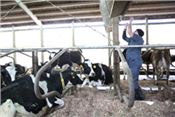Cow Water Beds Make For Sweet Dreams And More Milk
COLUMBIA, MO.
Water beds for cows improve comfort and milk production at the University of Missouri’s Foremost Dairy Research Center near Columbia.
MU Extension veterinarian Scott Poock and dairy specialist Stacey Hamilton are part of the Foremost team that researches how the beds improve herds. They monitor cows on cameras and record data about resting times and milk production.
Foremost began using the new beds in fall 2018. Cows adapted quickly, Hamilton says, with an estimated 75 percent of the herd using the beds by the second day.
The amount of rest a cow receives affects the quantity of milk she produces. In freestyle barn operations, dairy operators want cows to lie down 12-14 hours per day to prevent lameness and increase milk production. With the water beds, cows stay longer in stalls and lie down sooner, Poock says. Before the water beds, cows lay down an average of 8.5 minutes after entering a stall. They now lie down within five minutes.
The dual-chamber beds offer extra support for the cow’s knees. Once the cow kneels, the pillows offer a cushion for pressure points with gentle support. Strong joints provide better stability and prevent leg and foot injuries, sores and infections that can reduce mobility.
It is “all about cow comfort” and profit for the herd owner, says Hamilton. “Comfortable cows are happier and make more milk.”
Foremost staff put wood chips in the stalls to cover the water beds and catch waste. If Foremost used sand, it would take 50 pounds of sand per day per 160 stalls. The water beds are an easier option, Hamilton says.
The bovine beds cost about a third more than beds previously used at Foremost. Those beds, made of interlocking chopped rubber pieces, deteriorated with time and use.
Many dairy farms still use sand, straw, wood shavings or grass to keep stalls dry and comfortable for cows. Foremost Dairy is among a growing number of dairy farms using the new technology.
Last year, the BBC reported that cows at Queen Elizabeth II’s farm at Windsor Castle enjoy the luxury of water beds. Queen Elizabeth also pampers her cattle with green pastures and automatic brushes that remove dirt and relieve stress. The queen’s dairy uses robotics to milk cows and clean barn floors.
Meanwhile, across the pond, Foremost cows receive the royal treatment too.
Learn more about the Foremost Dairy Research Center at ForemostDairy.com ∆

MU Extension veterinarian Scott Poock sets up a camera to record how long cows rest on
newly installed water beds at MU’s Foremost Dairy.
Photo by Jessi Dodge

Cows at Foremost Dairy relax more since water beds were installed last year.
The water beds offer better cow comfort, which leads to more milk production.
Photo by Stacey Hamilton